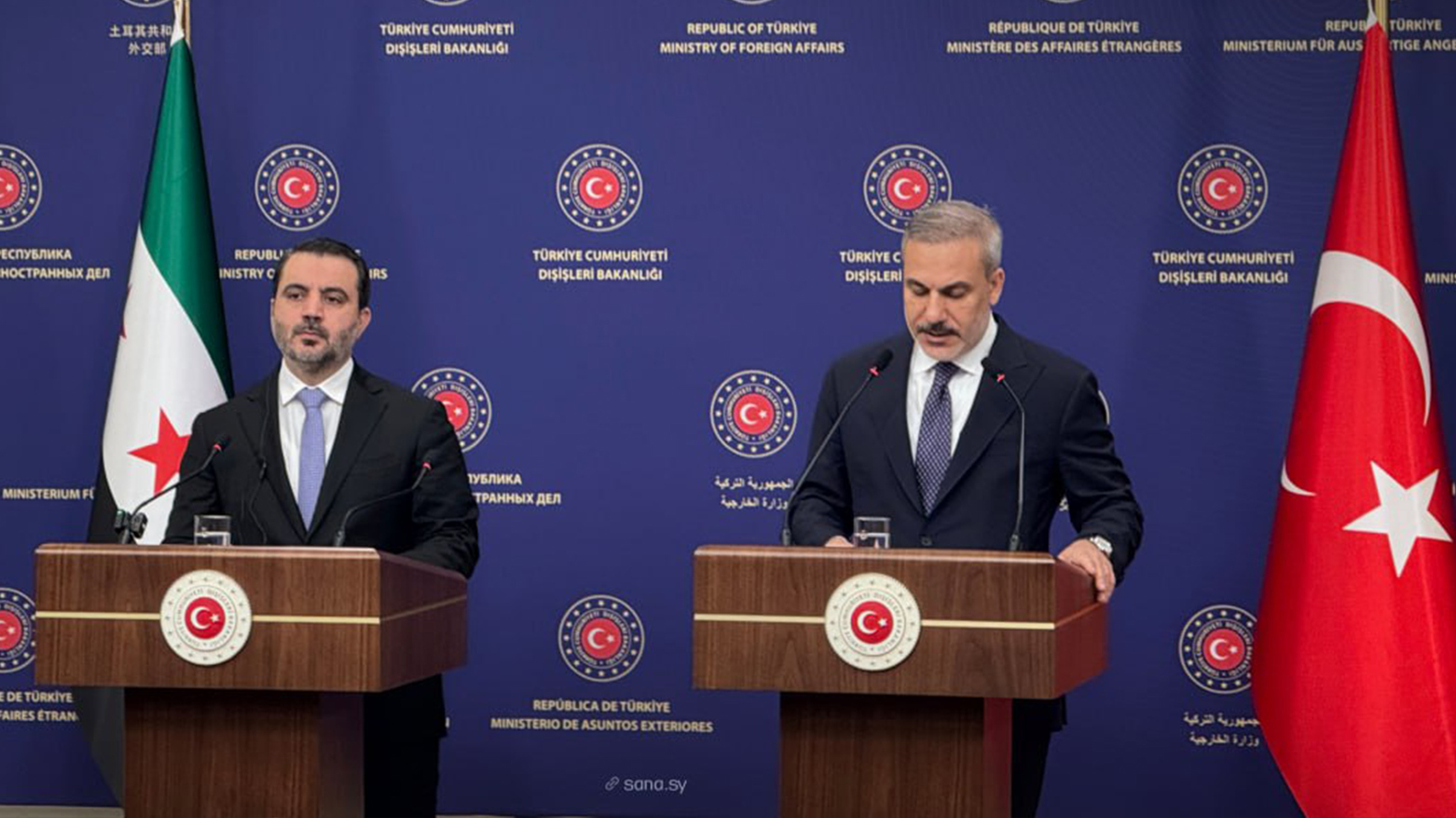Turkish and Syrian Foreign Ministers Pledge Joint Action on Key Issues
Turkish and Syrian foreign ministers pledged joint action on key issues including SDF disarmament, Israeli strikes, and implementing the March 10 Agreement during Ankara talks. Both officials emphasized Syria's territorial integrity while addressing post-election political coordination.

ERBIL (Kurdistan24) - Syrian Foreign Minister Asaad Hassan al-Shibani and his Turkish counterpart Hakan Fidan held a joint press conference in the Turkish capital Ankara on Wednesday, discussing a wide spectrum of political, security, and humanitarian issues, including the March 10 Agreement between the Syrian Interim Government and the Syrian Democratic Forces (SDF), the situation in Sweida, and the Israeli airstrikes on Syrian territory. The meeting comes in the aftermath of Syria’s October 5 parliamentary elections, and amid renewed regional engagement on stabilizing the post-Assad landscape.
Opening the conference, Turkish Foreign Minister Hakan Fidan emphasized the importance of sustained coordination between Ankara and Damascus following Syria’s first elections under the new transitional government.
Fidan stated that both sides had exchanged views on the latest developments between their countries, particularly after the downfall of the Assad regime. He revealed that Türkiye had presented several proposals to the new Syrian leadership aimed at ensuring that Syria would no longer be a “source of instability.” He stressed the need to combat terrorism through a comprehensive, non-exclusionary policy.
Touching on regional tensions, Fidan criticized Israeli military actions, describing them as “illegal operations that only worsen the existing crises.” He emphasized that peace in the region could only be achieved through the respect of territorial integrity, unity, and sovereignty of Syria, pledging Türkiye’s continued support for these efforts.
“The situation is clear,” he said. “In its current state, progress cannot be achieved unless the attacks stop. We must change our approach in the fight against ISIS. The operations require will, capability, and cooperation. We have all decided that collaboration is essential.”
The Turkish Foreign Minister also underlined that the SDF must abandon separatist agendas, reiterating Türkiye’s position regarding the matter. He reaffirmed support for the implementation of the March 10 Agreement, describing it as vital for peace, reconstruction, and inclusive governance:
Regarding Syria’s internal developments, Fidan added that Türkiye hoped the transitional government and the SDF would resolve their disputes peacefully, leading to “unity, integrity, and freedom for all Syrians.” He reiterated that both sides must “act transparently, avoid concealment, and present real solutions that serve both parties’ interests.”
Fidan also addressed the wider geopolitical situation, stating that Türkiye is in close consultation with Damascus, the United States, Jordan, and Israel, monitoring developments in the south of Syria, particularly Sweida, which he described as a “potential source of instability.”
In his remarks, Syrian Foreign Minister Asaad Hassan al-Shibani described the destruction left behind by the previous government, noting the massive damage to Syria’s infrastructure, economy, and institutions, and the suffering of millions of Syrians. Al-Shibani warned of new challenges now facing Syria, especially repeated Israeli attacks which he called a “clear violation of Syrian sovereignty.”
Al-Shibani also denounced “multiple foreign interventions, direct and indirect,” that seek to “weaken the Syrian state and create fragile divisions.” He accused external powers of “pushing the country toward sectarian and regional discord” but expressed confidence that “the awareness of our people will prevail and preserve national unity.”
Despite these challenges, al-Shibani asserted that Syria had begun its path of recovery through “practical and balanced steps,” restoring stability in most regions, reviving state institutions, and launching major investment projects in service and reconstruction sectors, alongside the gradual return of displaced citizens.
Concluding his statement, he warned against any attempts to spread chaos in Syria and called for the solidarity of friendly nations in supporting Syria’s path toward peace and reconstruction.
During the Q&A session, a reporter asked al-Shibani about his meeting in Amman with Jordanian Foreign Minister Ayman Safadi and U.S. Envoy Tom Barrack, as well as about recent developments in Sweida and the Hasakah conference related to the March 10 Agreement.
Al-Shibani confirmed the meeting took place in Jordan with the participation of the U.S. envoy, stating that discussions focused on “several issues, including Sweida.” He accused Israel of “artificially provoking sectarian tensions” in the region, but reaffirmed that “the protection of all citizens—Druze, Bedouin, and Christian alike—is the responsibility of the state.”
He rejected any form of exploitation of the Sweida situation for political gain, stressing that “Syria is rebuilding its social cohesion and repairing what the previous regime destroyed through division and incitement.”
On the Hasakah conference, al-Shibani dismissed it as “an illegitimate attempt to exploit national challenges,” saying:
“This conference does not represent the Syrian people or their elite—Arab, Kurdish, or religious. It violates the March 10 Agreement signed between the Syrian government and the SDF. The Syrian state remains the sole umbrella for resolving national issues and protecting minorities.”
He concluded by reaffirming Damascus’s rejection of “any chaotic attempts” to exploit internal divisions, emphasizing that the government seeks “to close gaps between Syrians and restore unity through dialogue, not confrontation.”
In response to another question regarding the SDF’s statement that it “will not withdraw,” Turkish Foreign Minister Hakan Fidan reiterated Ankara’s consistent stance that all Syrian factions must respect the country’s territorial unity.
“We must recognize the unity of Syrian lands and its diverse communities,” he said. “We want every group in Syria to live freely and peacefully under one national identity. However, the SDF must stop acting as a tool for foreign agendas—especially Israeli influence.”
Fidan concluded the conference by urging the SDF leadership to engage in “positive and continuous dialogue with the Damascus administration” and to “do everything possible to contribute to rebuilding Syria.” He added that foreign fighters and extremist elements “must leave the region entirely.”